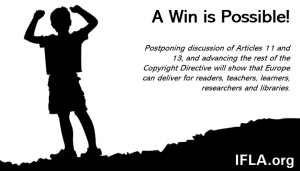2021’s International Day of Education (24 January) carries a different weight than it has in past years. Although universal access to education is well-established as a human right, as well as a driver of sustainable development, the COVID-19 pandemic has added a new-found urgency, as well as a new set of challenges, to its delivery.
Fittingly, this year’s International Day of Education is dedicated to the theme: ‘Recover and Revitalize Education for the COVID-19 Generation’.
From UNESCO: “Now is the time to power education by stepping up collaboration and international solidarity to place education and lifelong learning at the centre of the recovery.”
Libraries are an essential piece of this recovery.
As the world begins to look towards a post-COVID world, the theme of this year’s International Day of Education is a call to libraries to advocate for – and deliver on – their role in building back better through enabling and promoting learning.
The groundwork is there – libraries are already helping to reduce inequalities in education. One example is through their role in providing access to the internet, which increasingly is becoming a deciding factor in a student’s ability to engage in school.
In so many places already, libraries and their staff are helping their communities stay connected with the resources, support, and tools that are needed not only to recover, but also to revitalise, education, and through it, lives.
Therefore, we are marking this day with some lessons-learned during the pandemic, as well as a look to the future of education – and libraries’ role in it.
COVID-19 and Support for Remote Learning
Since March 2020, IFLA has been monitoring library responses to the pandemic. This has provided a picture of how libraries have continued serving their communities despite physical closures and other restrictions. It has also provided a trove of stories showing how libraries have upheld support for education through challenging times.
You can find many examples to inform your own initiatives on our website.
Shared Stories: Public Libraries in Egypt
Heba Ismail, Secretary of the CPDWL Section and Libraries Technical Manager at Egypt’s Society for Culture & Development has shared a look at how libraries across Egypt have found success in engaging users during the pandemic. Here are some of ways they have supported education at all stages of life during this time:
- Sharing links to educational resources in science, arts, culture, and heritage
- Storytelling workshops for young readers
- Free training workshops for school-aged students to assist with research-based projects, which replace end-of-year exams for most students
- Online training services on topics including English Language and Computer Skills, conducted via Facebook
- Participation in a national initiative to provide virtual programmes to train and qualify youth for the labour market
- Conducting online courses in cooperation with civil society institutions such as the Arab Women Association.
- Providing COVID-19 and public health information
See her full article online here.
COVID-19 and Professional Development
Librarians are not only the providers of lifelong learning. Librarians must also be recipients of ongoing training and professional development to enable agility in the face of rapid change.
IFLA’s CPDWL Section shared experiences and explored this concept further in their January 2021 newsletter.
Shared Stories: Tips and Lessons-Learned
Rajen Munoo, of the Singapore Management University Libraries, shares a key lesson regarding opportunities that may come hidden in the challenges of COVID-19: “Continued learning and upskilling is the new vaccine in managing our own personal professional development”.
Here are some ways that Section members found they could continue their own continued professional development (CPD) and learning during the pandemic:
- Attend virtual conferences and webinars. Take the opportunity to discover new topics, such as research data management, open science, advocacy, and leadership. Not needing to travel may help you get approval from your institutions’ leadership to explore new areas.
- Find opportunities to upskill in areas that support your institution’s digital transformation. This may include building competency in tools such as Microsoft Teams, Zoom, Outlook, Blackboard Collaborate, Mentimeter, and Leganto (Ex Libris resource list management system).
- Get familiar with new formats for teaching and sharing information virtually, such as creating short videos.
- Focus learning on open access information, such as online databases, repositories, scientific periodical portals, electronic book collections
- Don’t forget personal well-being. Training in stress management and mindfulness can be helpful for both staff and users.
- Get involved with mentoring programmes to facilitate knowledge-exchange between professionals at different career stages. Involvement in a national (or international) library association may help connect you to these opportunities.
While enriching librarians’ careers, these skills go beyond personal growth. They can be instrumental in helping library and information professionals meet the challenges of a post-COVID world.
Beyond COVID-19: The Future of Education
Perhaps as much as anything, the pandemic has made the deep inequalities that persist within our societies abundantly clear.
In terms of education, this means that those who are most disadvantaged have also been impacted the hardest.
The UN refers to COVID-19 as the largest disruption of education systems in history. While closures of schools and other learning spaces have “impacted 94% of the world’s student population”, the UN reports that this impact is up to 99% in low and lower-middle income countries [source].
Pre-existing education inequalities, such as reduced opportunities for those living in poor or rural areas, girls, refugees, persons with disabilities and forcibly displaced persons, have been worsened by the pandemic. These inequalities must be addressed to both recover and rejuvenate global education.
Reimagine Education
One of the UN’s recommendations to prevent further crisis is to “reimagine education and accelerate change in teaching and learning” [source, page 3]. This includes focussing on the needs of marginalised groups, offering employability programmes, supporting educators, and remove barriers to connectivity.
Innovative methods developed during the pandemic to provide services remotely, engage the public online, and connect more people to library services can continue benefiting society in the future.
IFLA stands ready to support the library profession in this work as we look to recovery and rejuvenation.
What can you do?
Advocate! – gather stories of how your library has adapted during the pandemic in order to support education and learning, and how it will continue these services in the future. Share these stories on your communication channels, with decision-makers, and with your local library association.
Learn Yourself! – be sure to take note of lessons you have learned during the pandemic, think about how they can help others now and in the future. Take advantage of opportunities to develop skills that can help you more effectively provide access to information and education.
Start Local! – identify inequalities in learning that exist in your community and align your programmes and services to address them. Look to team up with educators at your school, university, or within your community to amplify and support each other’s work.
 Discussions around the European Union’s draft Directive on copyright in the Digital Single Market are as tense as ever. Strong divisions have emerged between and among Member States and Members of the European Parliament around controversial proposals for a new press publishers’ right (Article 11) and an (effective) obligation on internet platforms to filter content (Article 13).
Discussions around the European Union’s draft Directive on copyright in the Digital Single Market are as tense as ever. Strong divisions have emerged between and among Member States and Members of the European Parliament around controversial proposals for a new press publishers’ right (Article 11) and an (effective) obligation on internet platforms to filter content (Article 13). The Good – Achievements So Far
The Good – Achievements So Far However, there are already complaints from some who had previously supported Articles 11 and 13, who are unwilling to accept anything less than the highly flawed original proposals.
However, there are already complaints from some who had previously supported Articles 11 and 13, who are unwilling to accept anything less than the highly flawed original proposals.